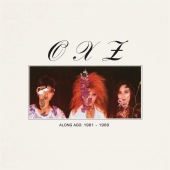
Oxz
Along Ago 1981-1989
Label: Captured Tracks
Genre: 80s Wave / Rock / Pop / Punk
Availability
- LP + MP3 COUPON €23.99 Dispatched within 5-10 working days
Nothing happens in a vacuum, however. It was already acceptable for young women to form bands in the safety of their high school music clubs. They generally played cover songs at school events. However, actually stepping out into the dirty world of live houses was for the adventurous and compelled. To do so in OXZ’s overtly provocative, dramatic way was unheard of. Contemporaries of Shonen Knife, OXZ were known for the intensity of their live performances. Releasing their first EP in 1984 – an 8” EP – their catalog belies their reputation for moody, dark post-punk ahead of its time. The bass and drums dominate; the guitars are angular and spiky – punk, but with something extra. Along Ago: 1981-1989 collects the band’s entire catalog – three EPs and a single – alongside unearthed, unreleased demos.
Then, 1989, it ended as the band went their separate ways. And the name? No one seems to remember how it came about, but it should be noted that in Japan, O means acceptable and X means rejected, so maybe OXZ means “going beyond all usual standards.”
“One of the pioneering Japanese female underground bands... unique, strange and provocative.” - Makoto Kawabata (Acid Mother’s Temple)
